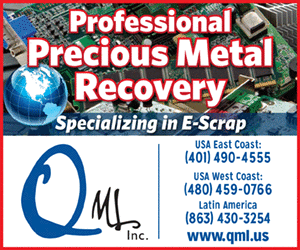Bronte and Dominique, two consumers who in “Silicon Mountain” are tasked with trying to replace the batteries in their smartphones.
With export scandals, CRT stockpiles and more, the electronics recycling industry has suffered its share of image bruises. A short film being launched by an ERP vendor, however, casts a far more pleasant glow on the business of electronics recovery.
“Silicon Mountain” is a 26-minute documentary from enterprise resource planning software provider The Vested Group that is being released online today and will also be screened during E-Scrap Virtual next month. It’s the product of roughly two years of research and filming undertaken by a small production team.
The end result is a movie that features leaders from a number of processing companies and industry groups (HOBI, Sunnking, iFixit and the Institute of Scrap Recycling Industries, to name a few). And it makes the point that the electronics recycling and repair sector is one populated by savvy entrepreneurs who are protecting the environment by finding efficient ways to handle the ever-growing array of devices being put on the market.
Images and interviews from inside well-tuned processing plants stand in stark contrast to clips from pit mines shown in the movie. The takeaway for a member of the general public: By having your devices repaired and recycled, you are helping to keep resources in the ground – and also helping to keep hazardous waste out of it.
“There are some documentaries out there about the industry and it’s pretty dire,” Hillary Patterson, the film’s co-executive producer, said in an interview. “This is an upbeat, positive view of the industry and the people involved.”
Hillary and her husband, Joel, who is founder of The Vested Group, said they first became exposed to the e-scrap and ITAD industry seven years ago, and they were surprised by the intricacies and challenges that come with proper electronics management.
As The Vested Group’s software became used more widely in the sector and the Pattersons’ knowledge grew, they started developing the idea of a documentary to help general consumers have their own e-scrap “aha” moments.
“We saw this as a way to really communicate out to the masses,” said Joel Patterson, who is also a co-executive producer of the film.
“Silicon Mountain” will be screened during E-Scrap Virtual next month.
A particular focus of “Silicon Mountain” is the repairability of electronic devices.
At one point in the film, Joel Patterson makes clear his position on “right to repair,” a movement that has spawned bills in many legislatures that would require manufacturers to provide tools and information to aid electronics repair and refurbishment.
“We want to see that legislation passed,” Patterson notes on-screen. “Just allow [technicians] to do their job. That’s all we’re really asking.”
The documentary also illustrates the sense of empowerment that can come when people are able to repair the things they own.
In interviews with Kyle Wiens of iFixit, tech writer Brian Merchant and a variety of processors, viewers come to understand how the expansion of the digital economy has led to an environment where consumers tend to not even consider device repair as an option.
But then we are presented with two young women, Bronte and Dominique, who are equipped with instructions and tools from iFixit and given a challenge: replacing the battery in an iPhone.
They start off confused and intimidated, as any everyday consumer would likely be. But they slowly and methodically work through the process, bemoaning the use of adhesives along the way. Eventually, they complete the replacement and try to turn the phone back on. It works, and their excitement is palpable.
The Pattersons said bringing that repair challenge into the film was the idea of their hired production team, which consisted of director Jack HS, cinematographer Jack Hass and producer Troy Farah. The trio brought expertise in filmmaking, not electronics recycling, and that turned out to be a benefit.
“They brought the perspective of the average Joe,” Joel Patterson said. “After they talked to Kyle Wiens, it just made sense to see what it would be like having an everyday person trying to fix a phone.”
Trying to remove barriers to e-scrap repair and recycling is a wider goal of the “Silicon Mountain” project, and the Pattersons said they hope the movie can help encourage more people to leverage the existing e-scrap infrastructure.
“People are surprised to hear the component value of their electronics and the impact [repair and recycling] can have,” Hillary Patterson said. “And I think it’s intimidating trying to find a place that can do it safely. We’re trying to show how easy it is.”
More stories about refurbishment/reuse
- Data sanitization helps reduce premature device destruction
- Assurant acquires OptoFidelity to speed repair and reuse work
- Closed Loop enables eastern US electronics recovery corridor



